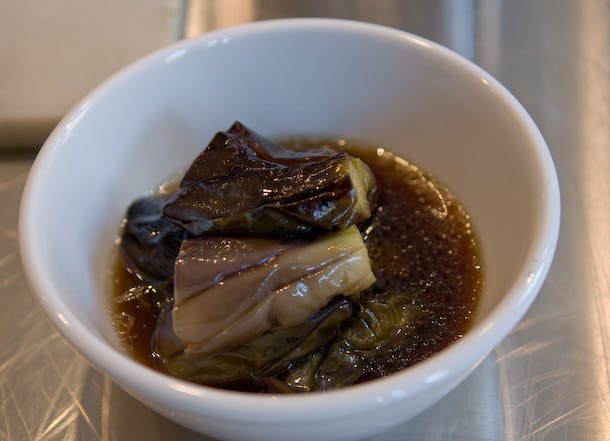
Simmered Japanese Eggplants
Atsushi demonstrates his Japanese cooking skills at Saveur's test kitchen in New York, preparing a delicious lunch for the editorial staff. The highlight of the menu is a crowd-pleasing dish of simmered Japanese eggplant, infused with flavors of dashi, mirin, and soy sauce. Follow the provided recipe for a taste of delicate, tender eggplant with umami and sweet-salty flavors.
During his stay in New York, Saveur's editor-in-chief Jim Oseland graciously invited Atsushi to demonstrate his cooking at the magazine's test kitchen, and prepare lunch for the editorial staff. Atsushi planned a wonderful menu, incorporating dishes we had cooked plus new ones. After last minute sprints to the farmers market and Sunrise Mart, the Japanese food store in lower Manhattan, we arrived at the magazine laden with supplies, and Atsushi set to work.
Heres a preparation for eggplant, a crowd-pleasing favorite and classic Japanese vegetable of summertime. Applying the otoshibuta Chef Atsushi Nakahigashi simmered Japanese eggplant, shaped like long purple-black fingers, in dashi, soy sauce and mirin. Here's how he did it:
Ingredients:
- Japanese eggplants
- Konbu-katsuo dashi, prepared ahead of time
- Mirin
- Usukuchi soy sauce (light soy sauce)
- High smoke point vegetable oil for deep frying
Instructions:
-
Prepare the Eggplants:
- Remove the tops from four eggplants and cut them in half through the middle. Make several lengthwise incisions about 1/4 inch deep around the pieces to facilitate the penetration of heat and flavors.
-
Deep Frying:
- Heat the oil in a saucepan to 350°F for deep frying. Deep fry the eggplant halves for about 3 minutes until they are softened and cooked through, then transfer them to a paper towel-lined dish to drain. This step ensures the eggplants are ready to absorb the simmering liquid.
-
Simmering Preparation:
- Once cooled, transfer the eggplants to a small saucepan. Add about 2 cups of konbu-katsuo dashi so it covers the eggplants but doesn't completely immerse them; they should slightly stick out of the liquid.
-
Seasoning:
- Add a quarter cup each of mirin and usukuchi soy sauce to balance the sweet and salty flavors.
-
Simmering:
- Place an aluminum foil otoshibuta (foil lid) directly on the eggplants and turn the heat to high. Once the liquid boils, reduce the heat to medium and allow it to simmer. The liquid should foam beneath the otoshibuta, indicating the flavors are infusing into the eggplants. After about 10 minutes of simmering, the eggplants should be ready.
Techniques and Their Purposes:
- Lengthwise Incisions: Allow heat and flavors to more easily penetrate the flesh of the eggplants.
- Deep Frying Before Simmering: Softens the eggplants, making them more receptive to the flavors of the simmering liquid.
- Using Konbu-Katsuo Dashi: Adds a deep umami flavor as the base of the simmering liquid.
- Balancing Mirin and Soy Sauce: Creates a harmonious blend of sweetness and saltiness in the dish.
- Simmering with Otoshibuta: Ensures even cooking and flavor absorption, while the foil lid helps to retain moisture and infuse the eggplants thoroughly with the seasoning.
Serve the eggplants with a bit of the cooking liquid.
